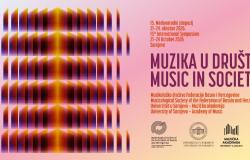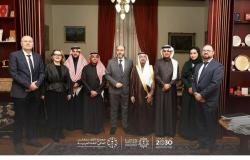In memoriam: Osman-Faruk Sijarić

At the age of 78, Osman Faruk Sijarić, a professor at the Music Academy of the University of Sarajevo passed away. He was one of the few people who could be proud of the multiple qualities of a humanist, a respected professor, a guardian of the Academy of Music during the war, a polyglot, a politician of democratic convictions, a protector of good and sensitive people. I have seldom known a man with so much attention to other people, without showing it openly but selflessly and with much care not to hurt another.
Osman-Faruk Sijarić was born on 17 May1942 in Mostar, to father Ćamil, a famous Bosnian writer, and mother Sabina. As he says in one of his biographies, during the Second World War, they hid in many cities in BiH, waited for the end of the war in Banja Luka, and in 1947 finally settled in Sarajevo. He attended elementary music school in the class of Prof. E. Sejpke and the High School of Music in the class of the famous professor Kurt Hauser. He graduated in Sarajevo, and after three years as a very talented student, he enrolled in the study of violin at the Music Academy in Sarajevo. In parallel with the High School of Music, he also graduated from the Classical Gymnasium, where he studied Arabic, Turkish, French and Latin. He graduated on 1 October 1966 at the Department of Violin of the Music Academy in Sarajevo in the class of prof. Kurt Hauser with Bach's Sonata for solo violin no. 1, G minor, Beethoven's Sonata Op. 30, no. 2, Paganini's Concerto no. 2 in H minor and Ravel's Gypsy. At the same time, he graduated in pure philosophy at the Faculty of Philosophy in Sarajevo. During his studies, in addition to his interest in classical languages, he also mastered Russian and English, and his interest in history and archeology resulted in his participation in archeological excavations organized by the National Museum in Bobovac and Ilidža. He then enrolled in the postgraduate study of violin at the Academy of Music in Ljubljana in the class of Leon Pfeifer. He studied in Ljubljana for three semesters, and then, after receiving a national scholarship, he went to Moscow to the State Conservatory (1968) where he specialized for two years in the class of Galina Barinova. After specialization, he takes the entrance exam and enrolls in an assistantship-internship, i.e. a master's degree, at the Music-Pedagogical Institute Gnesin in the class of P. A. Bondarenko. Along with the violin as his main instrument, he took Pedagogy, Aesthetics, Methodology and Theory and History of Violin Art, as was the custom at the Gnesin Institute, unlike the Yugoslav academies where only the violin was taken. He completed his studies in Moscow on 10 October 1972 with the program Tartini Sonata in G minor, Bach Adagio and Fugue, Issai Sonata for solo violin and Concerto for violin and orchestra in D major by L. van Beethoven.
In 1975, he realized his study stay in the USA, where he participated in numerous concerts, lecture tribunes, TV shows, etc.
After returning from studies in the USSR, Prof. Sijarić first worked at the Music High School, and from 26 June 1974 at the Music Academy in Sarajevo, where he worked in all professions, from assistant trainee (26 June 1974), assistant (2 November 1976), assistant professor (17 November 1983), associate professor (29 June 1987) to full professor (11 March 1994). He also worked as a teacher in the Elementary Music School, the Sarajevo Philharmonic Orchestra and the once prestigious Radio Sarajevo Symphony Orchestra. In addition to teaching violin, he occasionally organized lectures at the City Lecture Tribune with topics in the field of violin and violin pedagogy, participated in radio shows and occasionally wrote articles in the field of political culture, participated in professional discussions on television and abroad, especially in shows related to kitsch and nonsense in music and culture.
He serves as the Music Academy dean from 1987 to 2003 and this is, as is well known, the longest Dean's term in the history of the Music Academy in Sarajevo.
He was University of Sarajevo Vice-Rector from 1994 to 1997.
Prof. Sijarić retired on 30 September 2009, and worked until 30 September 2012 as an engaged professor.
Perhaps the most important period of his Dean's office term was during the 1992/95 war and a little later. In his memory of that period of work at the Academy of Music, published in the monograph The 50th Academy of Music in Sarajevo’s Anniversary (2006), Faruk Sijarić speaks very emotionally, sincerely and with inspiration about his role in preserving work, status and even dignity of the Music Academy and its few teachers who remained in Sarajevo. I personally remember his merit that the building of the Academy, after all, the Secondary and Primary Music School, was not turned into a military barracks, which would probably be the final disappearance of these institutions or the long-term cessation of their work. But what we remember most is his commitment to the people, going to the congresses of the Association of European Conservatories where he contacted European colleagues, organized concerts and collected financial aid for the teachers of the Academy. Several times during the war he managed to raise funds to help teachers survive the war. Another of his important merits is receiving scholarships for students of the Academy of Music to study at the prestigious Vienna Hochschule für Musik und Darstellende Kunst. These scholarships enabled the education of twelve students in various departments, including composition, which was of long-term importance for shifting the artistic horizons of the Academy, as most of these students returned after their studies and started working at the Academy as assistants. The third merit that must be emphasized is his constant struggle for the teaching staff. Of the 45 pre-war teachers, only 15 teachers and assistants remained at the end of the war. After the war Prof. Sijarić renews the work of almost all classes and lines of study by hiring teachers from abroad and hiring domestic staff, so that by 1998 the Academy already had enough teachers and associates for the almost normal course of the teaching process in all study lines. The next important outcome of Sijarić's work was the provision of funds and the purchase of four Steinway pianos in 1998, which renewed the instruments and replaced several pianos destroyed in shelling during the war, especially in 1992 when the Academy was hit by four grenades and destroyed the chamber music cabinet for strings with two pianos, as well as the concert hall of the High School of Music, and, especially tragically, the library of the Academy. After the war, this library was also renovated with his efforts with a donation of Peters' music editions. What is also important, and that has been forgotten over time, is the effort of prof. Sijarić to renew the work of the Sarajevo Philharmonic Orchestra during 1993, which stopped working during the war. Without this type of operation of music institutions, there would be no world-famous civilizational achievements of culture and art in the besieged city of Sarajevo where Mr. Sc. Osman Faruk Sijarić played the key role.
Prof. Sijarić was a violin pedagogue dedicated to his work, responsible towards his students and a caring companion of their post-studio careers. I remember his pride when one of his students would make a concert performance or be successful in pedagogical practice. Through his pedagogical activity, he raised generations of concert-active violinists who today work in the country and abroad as artists or violin pedagogues.
He dedicated a significant part of his artistic career to promoting the works of Yugoslav and Bosnian composers Magdić, Smailović, Komadina, Špiler, Bego-Šimunić, Jeličanin, Cyprus, Miletić, Slavenski. As part of the cultural program, ZOI'84 also released a gramophone record with works by some of them as one of four discographic editions of art music in Bosnia and Herzegovina published before 1992. His concert activity was regularly accompanied by very affirmative reviews in the most important newspapers, radio and television editions in socialist Yugoslavia. His violin repertoire consisted of numerous standard works of violin literature, of which perhaps the most significant is Tchaikovsky's Concerto for Violin and Orchestra, which he played as a fourth-year student, and then on many occasions when concert policy in Yugoslav music centers allowed. In addition to Yugoslavia, he has played in West and East Germany, Austria, the Czech Republic, Slovakia, Turkey, Bulgaria, Sweden, the Netherlands, the USSR and the USA.
Criticisms of his playing were very affirmative. A Belgrade newspaper Politika published on 27 March 1979 the following: “(...) temperament, technique and musicality flowed from the violinist Sijarić, who presented himself with the works of Brahms, Chausson and Ravel"; Zagreb newspaper Vjesnik from 28 March 1979 writes “In the Third Sonata by R. L. Finney and especially in the Spiritual Sonata by W. Piston, Sijarić excelled in his performing purity, temperament and suggestive playing, with very reliable and cheerful support in the pianism of Lj. Pećanac.” Perhaps the most interesting critique was published in The Holland Sentinel of 19 June 1978: “Devilishly good technique and the momentum of Slavic romanticism is not a common combination among violinists.”
In addition to pedagogical and artistic activities, Osman-Faruk Sijarić was extremely active in the social and cultural life of Sarajevo and Bosnia and Herzegovina, as well as in various professional cultural organizations and institutions. He was the president of the Association of Music Educators of Yugoslavia, twice a member of the jury for the City of Sarajevo’s 6th of April Award, president of the Council for Music Activities of RTV BiH, president of the Assembly of SIZ of Culture of BiH and delegate Center for Social Activities of the University, Executive Secretary for Culture, Science and Education in the Municipal Committee of the League of Communists of the Municipality of Centar Sarajevo and many other social and professional associations. For his social work, Sijarić received a number of significant awards, including a plaque from the City of Sarajevo and the Order of Labor with Silver Rays.
Certainly Prof. Mr. Sc. Osman-Faruk Sijarić will be remembered in the annals of musical life in Yugoslavia and Bosnia and Herzegovina and enrolled as an artist and pedagogue of extraordinary musicality, great merits for the development of violin art, a significant figure in our not so rich space of art music. He and his followers are important links and inaugurators of significant achievements in musical artistic life, and especially in working at the Music Academy of the University of Sarajevo, where he successfully achieved pedagogical and artistic ambitions of a man for whom art was inspiration and consolation, and then life and professionally commitment.
Dr. Ivan Čavlović, Prof. Emeritus







